Unit 6 Do you like bananas-Section B (2a-Self Check) 课件 (共19张PPT)
文档属性
| 名称 | Unit 6 Do you like bananas-Section B (2a-Self Check) 课件 (共19张PPT) | 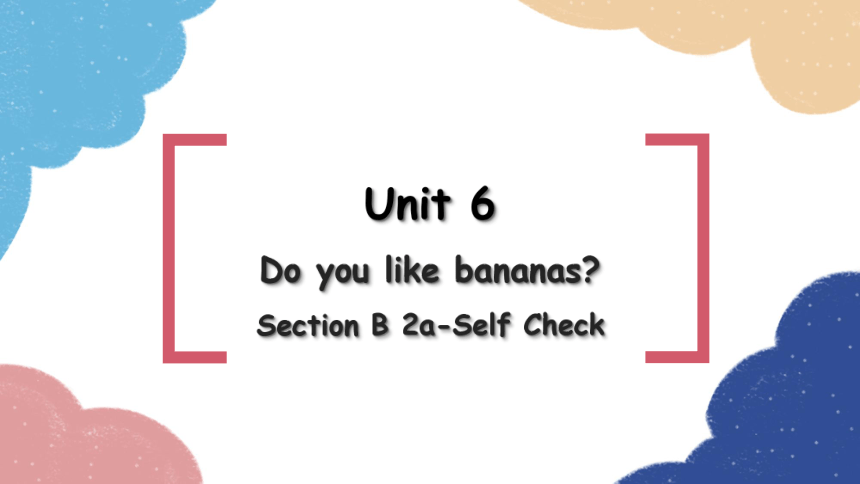 | |
| 格式 | zip | ||
| 文件大小 | 1.1MB | ||
| 资源类型 | 教案 | ||
| 版本资源 | 人教新目标(Go for it)版 | ||
| 科目 | 英语 | ||
| 更新时间 | 2022-10-10 13:18:41 | ||
图片预览


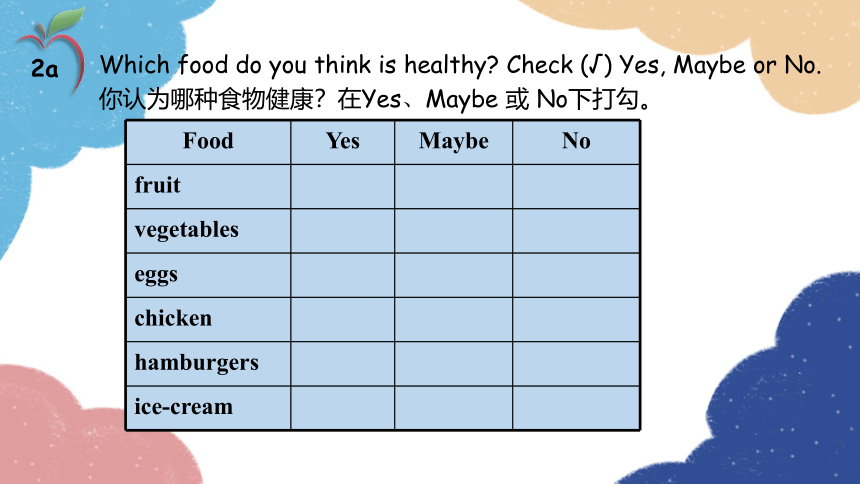
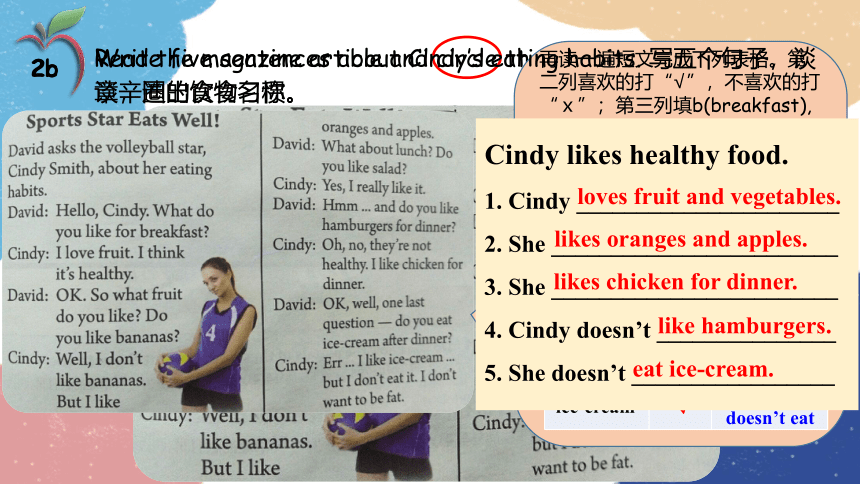
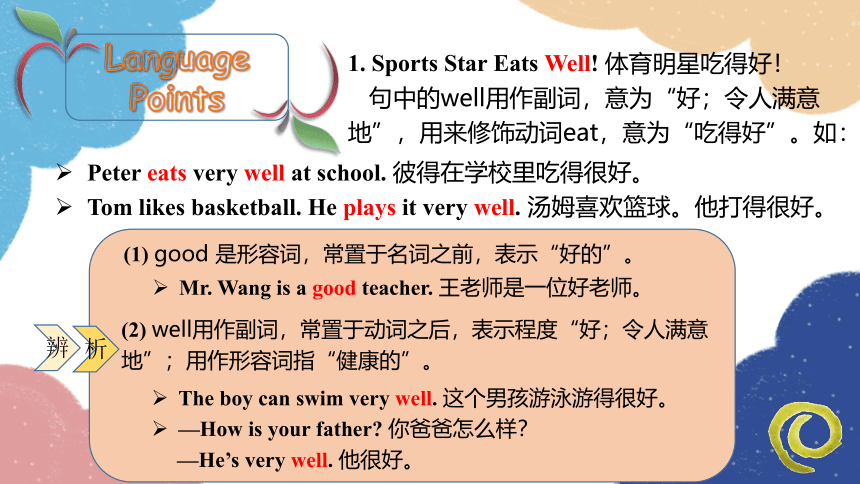
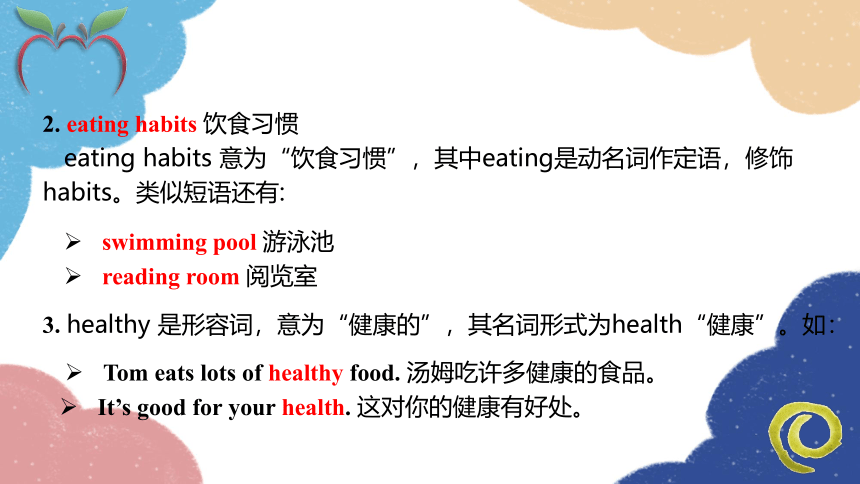
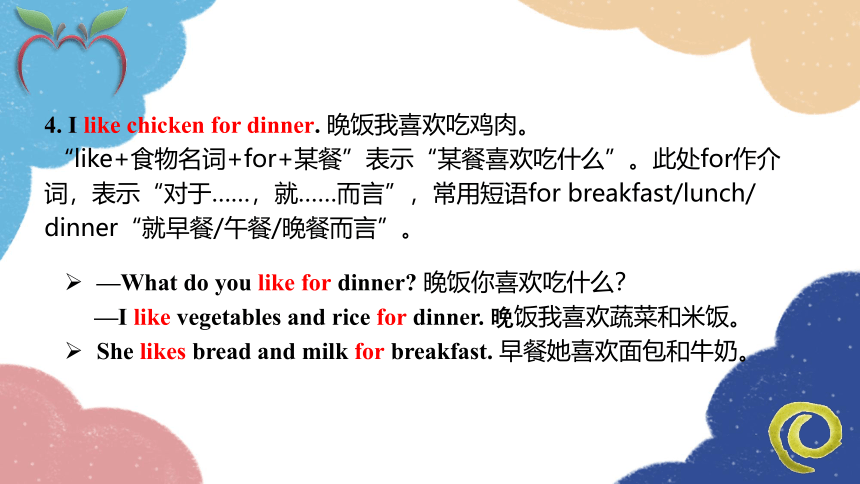
文档简介
(共19张PPT)
Unit 6
Do you like bananas
Section B 2a-Self Check
上节回顾
根据你的实际情况填写下面的表格。
Breakfast Lunch Dinner
Food
Are they healthy
healthy是形容词,意为“健康的”。
2a
Which food do you think is healthy Check (√) Yes, Maybe or No. 你认为哪种食物健康?在Yes、Maybe 或 No下打勾。
Food Yes Maybe No
fruit
vegetables
eggs
chicken
hamburgers
ice-cream
2b
Read the magazine article and circle the food words. 阅读杂志文章,圈出食物名称。
再读一遍短文完成下列表格。第二列喜欢的打“√”,不喜欢的打“ⅹ”;第三列填b(breakfast), l(lunch), d(dinner)。
Food Like Meal
fruit
banana
orange
apple
salad
hamburger
chicken
ice-cream
√
√
√
√
√
√
ⅹ
ⅹ
b
b
b
l
d
likes but
doesn’t eat
2c
Write five sentences about Cindy’s eating habits. 写五个句子,谈谈辛迪的饮食习惯。
Cindy likes healthy food.
1. Cindy ______________________
2. She ________________________
3. She ________________________
4. Cindy doesn’t _______________
5. She doesn’t _________________
loves fruit and vegetables.
eat ice-cream.
likes oranges and apples.
likes chicken for dinner.
like hamburgers.
Language Points
1. Sports Star Eats Well! 体育明星吃得好!
句中的well用作副词,意为“好;令人满意
地”,用来修饰动词eat,意为“吃得好”。如:
Peter eats very well at school. 彼得在学校里吃得很好。
Tom likes basketball. He plays it very well. 汤姆喜欢篮球。他打得很好。
辨
析
Mr. Wang is a good teacher. 王老师是一位好老师。
The boy can swim very well. 这个男孩游泳游得很好。
—How is your father 你爸爸怎么样?
—He’s very well. 他很好。
(2) well用作副词,常置于动词之后,表示程度“好;令人满意地”;用作形容词指“健康的”。
(1) good 是形容词,常置于名词之前,表示“好的”。
2. eating habits 饮食习惯
eating habits 意为“饮食习惯”,其中eating是动名词作定语,修饰
habits。类似短语还有:
swimming pool 游泳池
reading room 阅览室
3. healthy 是形容词,意为“健康的”,其名词形式为health“健康”。如:
Tom eats lots of healthy food. 汤姆吃许多健康的食品。
It’s good for your health. 这对你的健康有好处。
4. I like chicken for dinner. 晚饭我喜欢吃鸡肉。
“like+食物名词+for+某餐”表示“某餐喜欢吃什么”。此处for作介词,表示“对于……,就……而言”,常用短语for breakfast/lunch/ dinner“就早餐/午餐/晚餐而言”。
—What do you like for dinner 晚饭你喜欢吃什么?
—I like vegetables and rice for dinner. 晚饭我喜欢蔬菜和米饭。
She likes bread and milk for breakfast. 早餐她喜欢面包和牛奶。
5. really用作副词,意为“真正地”,主要用于强调与事实或现实不相违
背,也可表示不快、惊奇或某种含蓄的怀疑。
It’s really good. 它真的很好。
Does he really like it 他真的喜欢它吗?
6. question用作名词,意为“问题”,通常指口头或书面提出来要求回
答或有待讨论、解决的问题。
I have a question to ask you. 我有个问题要问你。
7. I don’t want to be fat. 我不想变胖。
want 用作动词,意为“想要;需要”,常见用法有:want sth.“想要某物”;want to do sth.“想要去做某事”;want sb. to do sth.“想要某人去做某事”。如:
I want some rice. 我想要些米饭。
She wants to ask a question. 她想问个问题。
Jack wants me to go to school with him. 杰克想让我和他一起去上学。
3a
Complete the survey. 完成调查表。
Breakfast Lunch Dinner
I like
I don’t like
My partner likes
My partner doesn’t like
A: Do you like eggs for breakfast
B: No, I don’t. I like oranges.
3b
Write about what you and your partner like and don’t like for breakfast, lunch and dinner. 写出你和同伴一日三餐喜欢吃什么、不喜欢吃什么。
For breakfast, I like _____________, but I don’t like _____________.
For lunch, ________________________________________________.
And for dinner, ____________________________________________.
For breakfast, ______ likes __________________________________.
For lunch, ________________________________________________.
And for dinner, ____________________________________________.
1. Do you know the plurals of these words Put them in the correct
columns. 下面单词的复数形式是什么?将它们写在相应的栏目里。
Self Check
+s +es y →i+es
hamburgers
tables
photos
apples
hats
vegetables
eggs
keys
radios
carrots
pencils
pears
bananas
volleyballs
tomatoes
strawberries
dictionaries
families
2. What food, sports and colors do you like and dislike 你喜欢什么食
物、运动和颜色?不喜欢什么?
3. What food, sports and colors do your parents like and dislike
Write at least five sentences. 你父母喜欢什么食物、运动和颜色?
不喜欢什么?至少写出五句话。
这是写他人的爱好的句子。应注意人称和数的变化。当谈及父亲或母亲一人时,应用第三人称单数形式。
Exercise
Ⅰ. 写出下列单词的复数形式。
1. tomato ____________
2. family ____________
3. girl ____________
4. volleyball ____________
5. strawberry ____________
6. hamburger ____________
7. orange ____________
8. watch ____________
9. photo ____________
10. carrot ____________
tomatoes
families
girls
volleyballs
strawberries
hamburgers
oranges
watches
photos
carrots
Ⅱ. 写出下列词组。
1. 生日晚餐 __________________
2. 下周 __________________
3. 考虑 __________________
4. 怎么样 __________________
5. 听起来不错 __________________
6. 让我们…… __________________
7. 体育明星 __________________
8. 饮食习惯 __________________
9. 就早餐而言 __________________
10. 晚餐后 __________________
birthday dinner
next week
think about
how/what about
sound good
let’s …
sports star
eating habit
for breakfast
after dinner
Ⅲ. 单项选择。
1. —Do you have eggs ______ lunch
—No, I don’t.
A. on B. for C. at
2. He has ______ egg and ______ orange for breakfast.
A. an; an B. a; a C. an; a
3. Here is some ______ on the table.
A. tomato B. egg C. chicken
4. —Does your son like carrots
—______.
A. Yes, she does B. Yes, he does C. No, she doesn’t
5. Her parents ______ breakfast at home.
A. doesn’t have B. haven’t C. don’t have
6. Let’s ______ some hamburgers.
A. eat B. has C. does
B
A
C
C
B
A
Ⅳ. 根据汉语意思填上正确的单词。
1. 我的饮食习惯很好。
My _________ _________ are good.
2. 你喜欢什么水果?
_________ _________ do you _________
3. 那听起来很好。
That _________ _________.
4. 早餐我喜欢鸡蛋和香蕉。
_________ _________, I like _________ and bananas.
5. 我不喜欢桔子,你呢?
I _________ like oranges. _________ _________ you
sounds
What
For
chicken
don’t
What/How
eating
habits
fruit
like
good
breakfast
about
Homework
下面表格是简一日三餐的喜好,请根据此表写一篇短文,介绍一下她的饮食习惯。首句已给出,不计入总词数。至少五句话。
Likes Doesn’t like
Breakfast eggs, bananas, bread pears, milk
Lunch salad, apples hamburgers
Dinner chicken, tomatoes ice-cream
Jane has healthy eating habits. ____________________________
_________________________________________________________
THANKS
Unit 6
Do you like bananas
Section B 2a-Self Check
上节回顾
根据你的实际情况填写下面的表格。
Breakfast Lunch Dinner
Food
Are they healthy
healthy是形容词,意为“健康的”。
2a
Which food do you think is healthy Check (√) Yes, Maybe or No. 你认为哪种食物健康?在Yes、Maybe 或 No下打勾。
Food Yes Maybe No
fruit
vegetables
eggs
chicken
hamburgers
ice-cream
2b
Read the magazine article and circle the food words. 阅读杂志文章,圈出食物名称。
再读一遍短文完成下列表格。第二列喜欢的打“√”,不喜欢的打“ⅹ”;第三列填b(breakfast), l(lunch), d(dinner)。
Food Like Meal
fruit
banana
orange
apple
salad
hamburger
chicken
ice-cream
√
√
√
√
√
√
ⅹ
ⅹ
b
b
b
l
d
likes but
doesn’t eat
2c
Write five sentences about Cindy’s eating habits. 写五个句子,谈谈辛迪的饮食习惯。
Cindy likes healthy food.
1. Cindy ______________________
2. She ________________________
3. She ________________________
4. Cindy doesn’t _______________
5. She doesn’t _________________
loves fruit and vegetables.
eat ice-cream.
likes oranges and apples.
likes chicken for dinner.
like hamburgers.
Language Points
1. Sports Star Eats Well! 体育明星吃得好!
句中的well用作副词,意为“好;令人满意
地”,用来修饰动词eat,意为“吃得好”。如:
Peter eats very well at school. 彼得在学校里吃得很好。
Tom likes basketball. He plays it very well. 汤姆喜欢篮球。他打得很好。
辨
析
Mr. Wang is a good teacher. 王老师是一位好老师。
The boy can swim very well. 这个男孩游泳游得很好。
—How is your father 你爸爸怎么样?
—He’s very well. 他很好。
(2) well用作副词,常置于动词之后,表示程度“好;令人满意地”;用作形容词指“健康的”。
(1) good 是形容词,常置于名词之前,表示“好的”。
2. eating habits 饮食习惯
eating habits 意为“饮食习惯”,其中eating是动名词作定语,修饰
habits。类似短语还有:
swimming pool 游泳池
reading room 阅览室
3. healthy 是形容词,意为“健康的”,其名词形式为health“健康”。如:
Tom eats lots of healthy food. 汤姆吃许多健康的食品。
It’s good for your health. 这对你的健康有好处。
4. I like chicken for dinner. 晚饭我喜欢吃鸡肉。
“like+食物名词+for+某餐”表示“某餐喜欢吃什么”。此处for作介词,表示“对于……,就……而言”,常用短语for breakfast/lunch/ dinner“就早餐/午餐/晚餐而言”。
—What do you like for dinner 晚饭你喜欢吃什么?
—I like vegetables and rice for dinner. 晚饭我喜欢蔬菜和米饭。
She likes bread and milk for breakfast. 早餐她喜欢面包和牛奶。
5. really用作副词,意为“真正地”,主要用于强调与事实或现实不相违
背,也可表示不快、惊奇或某种含蓄的怀疑。
It’s really good. 它真的很好。
Does he really like it 他真的喜欢它吗?
6. question用作名词,意为“问题”,通常指口头或书面提出来要求回
答或有待讨论、解决的问题。
I have a question to ask you. 我有个问题要问你。
7. I don’t want to be fat. 我不想变胖。
want 用作动词,意为“想要;需要”,常见用法有:want sth.“想要某物”;want to do sth.“想要去做某事”;want sb. to do sth.“想要某人去做某事”。如:
I want some rice. 我想要些米饭。
She wants to ask a question. 她想问个问题。
Jack wants me to go to school with him. 杰克想让我和他一起去上学。
3a
Complete the survey. 完成调查表。
Breakfast Lunch Dinner
I like
I don’t like
My partner likes
My partner doesn’t like
A: Do you like eggs for breakfast
B: No, I don’t. I like oranges.
3b
Write about what you and your partner like and don’t like for breakfast, lunch and dinner. 写出你和同伴一日三餐喜欢吃什么、不喜欢吃什么。
For breakfast, I like _____________, but I don’t like _____________.
For lunch, ________________________________________________.
And for dinner, ____________________________________________.
For breakfast, ______ likes __________________________________.
For lunch, ________________________________________________.
And for dinner, ____________________________________________.
1. Do you know the plurals of these words Put them in the correct
columns. 下面单词的复数形式是什么?将它们写在相应的栏目里。
Self Check
+s +es y →i+es
hamburgers
tables
photos
apples
hats
vegetables
eggs
keys
radios
carrots
pencils
pears
bananas
volleyballs
tomatoes
strawberries
dictionaries
families
2. What food, sports and colors do you like and dislike 你喜欢什么食
物、运动和颜色?不喜欢什么?
3. What food, sports and colors do your parents like and dislike
Write at least five sentences. 你父母喜欢什么食物、运动和颜色?
不喜欢什么?至少写出五句话。
这是写他人的爱好的句子。应注意人称和数的变化。当谈及父亲或母亲一人时,应用第三人称单数形式。
Exercise
Ⅰ. 写出下列单词的复数形式。
1. tomato ____________
2. family ____________
3. girl ____________
4. volleyball ____________
5. strawberry ____________
6. hamburger ____________
7. orange ____________
8. watch ____________
9. photo ____________
10. carrot ____________
tomatoes
families
girls
volleyballs
strawberries
hamburgers
oranges
watches
photos
carrots
Ⅱ. 写出下列词组。
1. 生日晚餐 __________________
2. 下周 __________________
3. 考虑 __________________
4. 怎么样 __________________
5. 听起来不错 __________________
6. 让我们…… __________________
7. 体育明星 __________________
8. 饮食习惯 __________________
9. 就早餐而言 __________________
10. 晚餐后 __________________
birthday dinner
next week
think about
how/what about
sound good
let’s …
sports star
eating habit
for breakfast
after dinner
Ⅲ. 单项选择。
1. —Do you have eggs ______ lunch
—No, I don’t.
A. on B. for C. at
2. He has ______ egg and ______ orange for breakfast.
A. an; an B. a; a C. an; a
3. Here is some ______ on the table.
A. tomato B. egg C. chicken
4. —Does your son like carrots
—______.
A. Yes, she does B. Yes, he does C. No, she doesn’t
5. Her parents ______ breakfast at home.
A. doesn’t have B. haven’t C. don’t have
6. Let’s ______ some hamburgers.
A. eat B. has C. does
B
A
C
C
B
A
Ⅳ. 根据汉语意思填上正确的单词。
1. 我的饮食习惯很好。
My _________ _________ are good.
2. 你喜欢什么水果?
_________ _________ do you _________
3. 那听起来很好。
That _________ _________.
4. 早餐我喜欢鸡蛋和香蕉。
_________ _________, I like _________ and bananas.
5. 我不喜欢桔子,你呢?
I _________ like oranges. _________ _________ you
sounds
What
For
chicken
don’t
What/How
eating
habits
fruit
like
good
breakfast
about
Homework
下面表格是简一日三餐的喜好,请根据此表写一篇短文,介绍一下她的饮食习惯。首句已给出,不计入总词数。至少五句话。
Likes Doesn’t like
Breakfast eggs, bananas, bread pears, milk
Lunch salad, apples hamburgers
Dinner chicken, tomatoes ice-cream
Jane has healthy eating habits. ____________________________
_________________________________________________________
THANKS
同课章节目录
- starters 预备篇(2012秋审查)
- Unit 1 Good morning !
- Unit 2 What’s this in English?
- Unit 3 What color is it ?
- Unit 1 My name's Gina.
- Section A
- Section B
- Unit 2 This is my sister.
- Section A
- Section B
- Unit 3 Is this your pencil?
- Section A
- Section B
- Unit 4 Where's my schoolbag?
- Section A
- Section B
- Unit 5 Do you have a soccer ball?
- Section A
- Section B
- Unit 6 Do you like bananas?
- Section A
- Section B
- Unit 7 How much are these socks?
- Section A
- Section B
- Unit 8 When is your birthday?
- Section A
- Section B
- Unit 9 My favorite subject is science.
- Section A
- Section B
